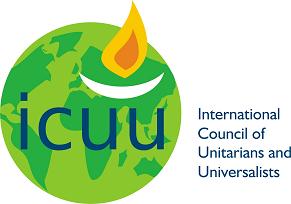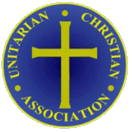
The International Council of Unitarians and Universalists (ICUU) is an umbrella organization founded in 1995 bringing together many Unitarian, Universalist, and Unitarian Universalist organizations. The size of the affiliated organizations varies widely. Some groups represent only a few hundred people; while the largest, the Unitarian Universalist Association, has over 160,000 members and is larger than all the other groups put together.

Unitarian Universalism (UU) is a liberal religion characterized by a "free and responsible search for truth and meaning". Unitarian Universalists assert no creed, but instead are unified by their shared search for spiritual growth, guided by a dynamic, "living tradition". Currently, these traditions are summarized by the Six Sources and Seven Principles of Unitarian Universalism, documents recognized by all congregations who choose to be a part of the Unitarian Universalist Association. These documents are 'living', meaning always open for revisiting and reworking. Unitarian Universalist (U.U.) congregations include many atheists, agnostics, and theists within their membership - and there are U.U. churches / fellowships / congregations / societies all over America - as well as others around the world. The roots of Unitarian Universalism lie in liberal Christianity, specifically Unitarianism and universalism. Unitarian Universalists state that from these traditions comes a deep regard for intellectual freedom and inclusive love. Congregations and members seek inspiration and derive insight from all major world religions.
Unitarianism is a Christian theological movement named for its belief that the God in Christianity is one person, as opposed to the Trinity which in most other branches of Christianity defines God as one being in three persons: the Father, Son, and Holy Spirit. Unitarian Christians, therefore, believe that Jesus was inspired by God in his moral teachings, and he is a savior, but he was not a deity or God incarnate. As is typical of dissenters, Unitarianism does not constitute one single Christian denomination, but rather refers to a collection of both extant and extinct Christian groups, whether historically related to each other or not, which share a common theological concept of the oneness nature of God.
The General Assembly of Unitarian and Free Christian Churches is the umbrella organisation for Unitarian, Free Christians and other liberal religious congregations in the United Kingdom and Ireland. It was formed in 1928, with denominational roots going back to the Great Ejection of 1662. Its headquarters building is Essex Hall in central London, on the site of the first avowedly Unitarian chapel in England, set up in 1774.

The Non-subscribing Presbyterian Church of Ireland is a non-creedal Christian Church, which maintains a great emphasis on individual conscience in matters of Christian faith.

A united church, also called a uniting church, is a church formed from the merger or other form of union of two or more different Protestant denominations.

Liberal Christianity, also known as liberal theology, covers diverse philosophically and biblically informed religious movements and ideas within Christianity from the late 18th century onward. Liberal does not refer to progressive Christianity or to political liberalism but to the philosophical and religious thought that developed and grew as a consequence of the Enlightenment.

Christianity is the largest religion in Germany, and was introduced to the area of modern Germany with the conversion of the first Germanic tribes in the 4th century. The area became fully Christianized by the time of Charlemagne in the 8th and 9th centuries. After the reformation started by Martin Luther during the 16th century, a significant part of the population had a schism with the Catholic Church and became Protestant, mainly Lutherans and Calvinists.

Unitarier - Religionsgemeinschaft freien Glaubens is a unitarian religious organization in Germany. It was founded in 1876 in Germany's Rheinhessen region under the name Religionsgemeinschaft Freier Protestanten. Between 1950 and 2015 the organization was called Deutsche Unitarier Religionsgemeinschaft.

The Unitarian Christian Association (UCA) is a relatively small, though growing fellowship of Christians who feel an affinity with traditional Unitarianism and Free Christianity. The association is based in the United Kingdom and is an affiliated society of the General Assembly of Unitarian and Free Christian Churches, and has formal links with the European Liberal Protestant Network.
In Britain, the term Free Christian refers specifically to individual members and whole congregations within the General Assembly of Unitarian and Free Christian Churches.
Biblical Unitarianism encompasses the key doctrines of nontrinitarian Christians who affirm the Bible as their sole authority, and from it base their beliefs that God the Father is a singular being, the only one God, and that Jesus Christ is God’s son, but not divine. The term "biblical Unitarianism" is connected first with Robert Spears and Samuel Sharpe of the Christian Life magazine in the 1880s. It is a neologism that gained increasing currency in nontrinitarian literature during the 20th century as the mainstream Unitarian churches moved away from belief in the Bible and, in the United States, towards merger with Universalism. It has been used since the late 19th century by conservative Christian Unitarians, and sometimes by historians, to refer to Scripture-fundamentalist Unitarians of the 16th–18th centuries. Its use is problematic in that Unitarians from the 17th to the 20th centuries all had attachment to the Bible, but in differing ways.

Christian universalism is a school of Christian theology focused around the doctrine of universal reconciliation – the view that all human beings will ultimately be "saved" and restored to a right relationship with God.
Unitarianism, as a Christian denominational family of churches, was first defined in Poland-Lithuania and Transylvania in the late 16th century. It was then further developed in England and America until the early 19th century, although theological ancestors are to be found as far back as the early days of Christianity. It matured and reached its classical form in the middle 19th century. Later historical development has been diverse in different countries.

Protestantism is the second-largest form of Christianity with a total of 800 million to a billion adherents worldwide or about 40% of all Christians. It originated with the 16th century Reformation, a movement against what its followers perceived to be errors in the Roman Catholic Church. Protestants reject the Roman Catholic doctrine of papal supremacy and sacraments, but disagree among themselves regarding the real presence of Christ in the Eucharist. They emphasize the priesthood of all believers, justification by faith alone rather than also by good works, and the highest authority of the Bible alone in faith and morals. The "five solae" summarise basic theological differences in opposition to the Roman Catholic Church.
The Protestant Reformation began in 1520s in the Italian states, although forms of pre-Protestantism were already present before the 16th century. The Reformation in Italy collapsed quickly at the beginning of the 17th century. Its development was hindered by the Inquisition and also popular disdain.
Karol Grycz-Śmiłowski was a Polish Lutheran priest who sought to reestablish the Polish Brethren of the period 1565-1658.
Free Christians may refer to:









